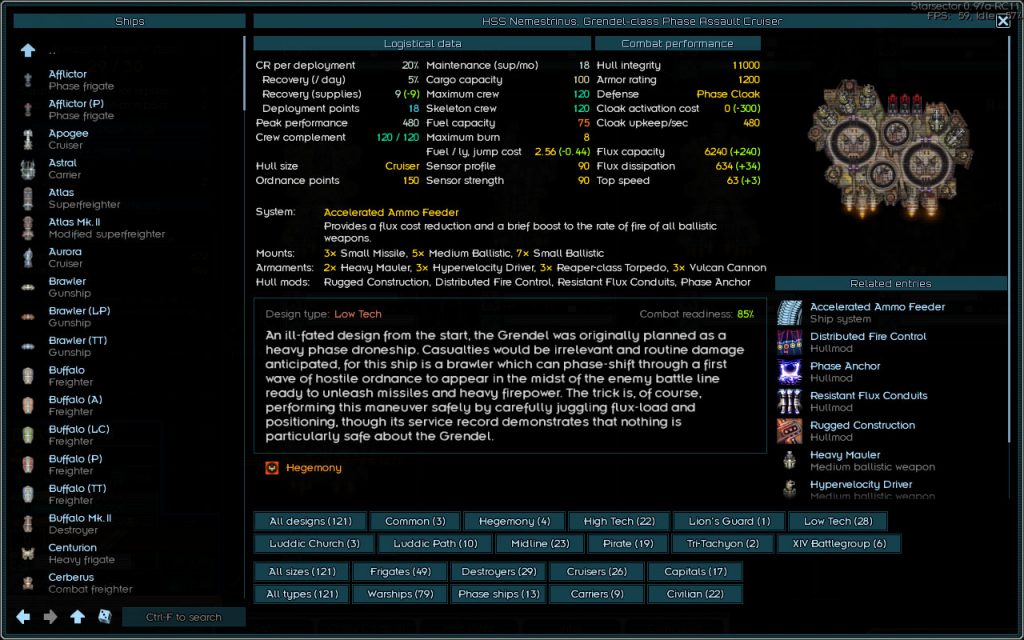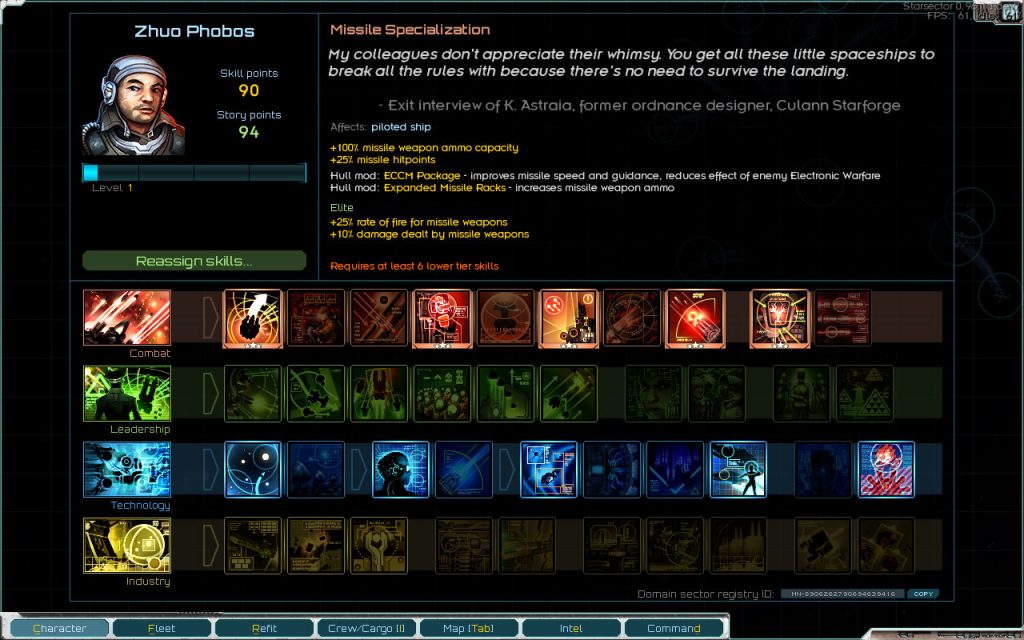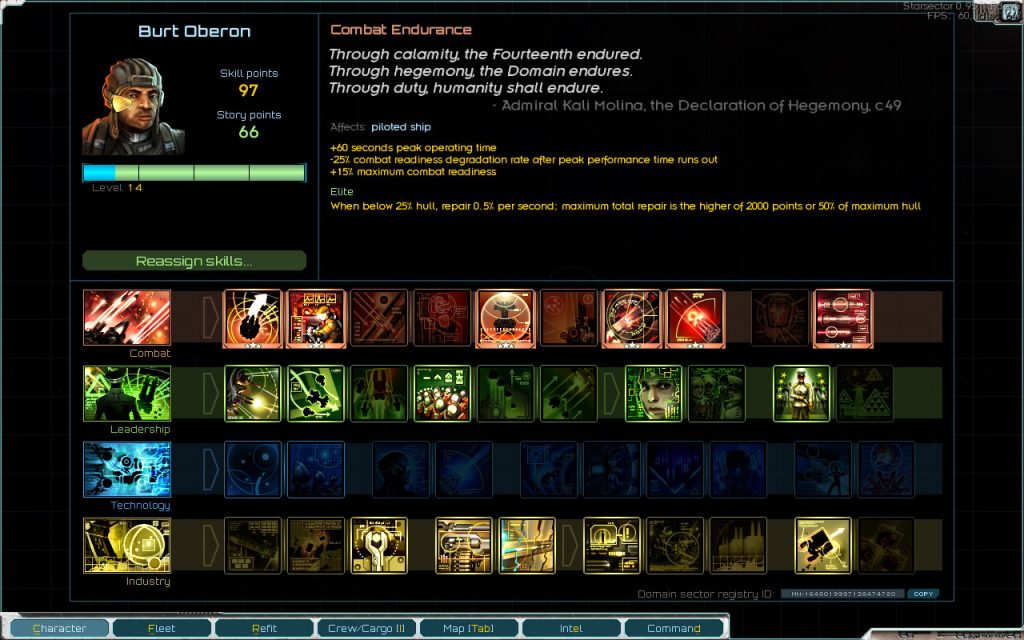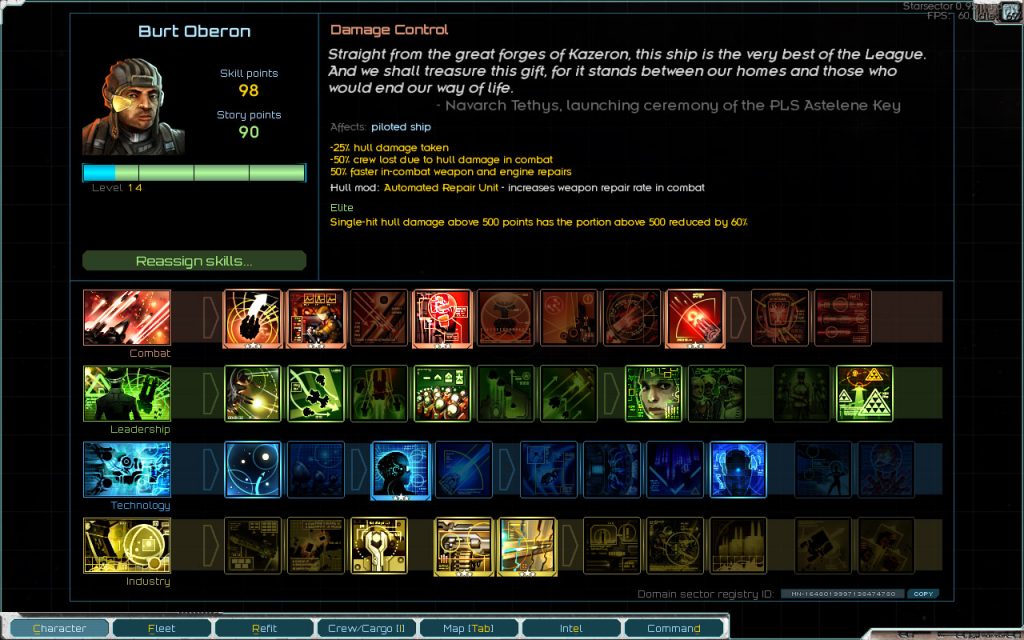First off: what the heck is the Codex? It’s basically an in-game encyclopedia where you can look up ships, weapons, and so on. The current implementation is very, very old and and this point really showing its age – frankly, it’s clunky and not very useful, but on the bright side, it’s also not strictly speaking a required feature, so it was fine to leave it be for a while. I’ve been on a roll with QoL work lately, though, and the game is certainly far enough along now for a proper Codex rework, so I decided to jump into it – I’d have to do it at some point!

I started working on the Codex update with a sort of standard question to get my bearings, design-wise – “why is this in the game?” That’s a question with sharp edges, because if there isn’t a good answer, then maybe it should be cut instead, and the time and effort put into other things. Obviously, that didn’t happen, or we’d have a much shorter blog post!
Read the rest of this entry »
I’ve been doing a bunch of work adjusting skills in the last couple of days. Since it’s so fresh in my mind, and since there were a lot of changes, it seemed like it might be interesting to talk about the reasoning behind each change – nothing huge, just a sentence or two describing the thought process. This is an extremely unplanned/impromptu post, and it (probably?) won’t be a very long one. [Editor’s note: this turned out to be overly optimistic.] I’ll try to organize things roughly in the order that I made the changes, so you get a little more of a real view into how this type of work goes sometimes.
Overview
First, a bit of a step back. While there are 4 different skill categories, or “aptitudes” (combat, leadership, tech, industry), there are two broad types of skills – ones that boost the ship you’re piloting, and ones that boost… everything else. From other ships in your fleet (usually including your flagship, though not boosting it as much as personal skills), to things like colonies , campaign travel and so on.

Coming at it fresh, it might seem “obvious” that skills that boost your fleet are way better than skills that boost your flagship. Boosting more things is clearly better than boosting fewer things! This is perfectly reasonable, but like many obvious things, it turns out to be wrong – or at least, more complicated than that. Read the rest of this entry »
Part one of this two-part blog post is here.
In this part, let’s dive into a few details about specific skills, and some other points note. I don’t want to go through every single change – just highlight some interesting tidbits, and a couple of the bigger changes.
Elite skills
One of the goals was to do a pass over the “elite” effects of the combat skills and make them more interesting/powerful/appealing. For example, Helmsmanship’s elite effect now – in addition to its original “0-flux boost at any level” effect – grants a flat +5 to top speed, making it a consideration for slower ships. Combat Endurance and Damage Control got some brand-new, fun elite effects.

Combat Endurance brings back the “repair ship hull during combat” effect from several versions ago – repairs up to 25% of the hull level, with total repairs not exceeding the higher of 50% of the hull, or, as of right now, 2000 points. With Combat Endurance being a skill that’s great for small ships, the elite effect is, too, because of the potential to repair far more than 50% of the hull over the course of a battle.
Damage Control’s elite effect grants a reduction to large hull hits – any hull hit above a certain threshold of damage has the portion above the threshold reduced by (again, as of right now) 60%. No-one plans on being hit by a Reaper torpedo, but still, neutralizing that much damage when things go wrong is going to have a lot of appeal. To make the skill not completely neutralize the strike potential of certain weapons, this effect only triggers at most once every two seconds.
Read the rest of this entry »
The skill system – the one in the currently released version, 0.95a – has some things about it that I like, and some things that I don’t think worked out particularly well. One feature is in both categories – “pick one of two skills at every tier”. In some cases, it works well and you have an interesting choice to make. In other cases, the skills don’t lend themselves as well to it, and it ends up feeling unnecessarily restrictive.
The other high-level feature of the system that I really like is the ability to have some top-tier skills that you need to invest into an aptitude to get, and that can be powerful and game-changing. You can’t have that in a system where you can cherry-pick any skill you want at any time.
So, the goal of these adjustments is to keep the progression and high-impact choices, and add more freedom where “pick one of two” doesn’t have a compelling reason behind it.

Read the rest of this entry »
The next update will add strong narrative RPG elements to Starsector, among other things.
I feel no small amount of trepidation because this is both a change and it is a particular story about particular characters in a way the pure sandbox certainly isn’t. This necessarily constrains your – the player’s – experience of the game-fantasy and the meta-game fantasy of an “unfinished game” which has the potential to become everyone’s dreams in a free-floating quantum state… until you see it for real and it turns out it isn’t quite what you dreamed.

I suppose this seems like an awfully negative way to start off; this is what I mean about trepidation. And I am legitimately excited about sharing more of the world of Starsector, letting players dive in a bit closer and get a feel for what it’s like for people that live in this world. Find out what they think, find out a bit more about why movers and shakers move like they do. If I may say so, I think we’ve done some pretty good work!
The written wordcount has already exceeded the minimum definition for a novel (50k) a few times over by now. I’ve attempted Nanowrimo a few times in the past and always choked almost instantly. My experience writing Starsector has been a stark contrast – the words just flow! It seems so obvious, most of the time, what comes next, what feels right to be said. I suspect part of it is the constraint of the medium focusing creativity, but it may also perhaps be the very clear connection to an audience (that’s y’all out there!). A novel feels a bit like a bunch of words floating out in (ha) space. A game, however, has a player. They must actively engage and progress. I know a player is committed in a way a reader isn’t. (Which probably isn’t at all true; people read books, after all. I’ve even read one or two in my day.)
Whatever it is, maybe I can’t rationalize it. But something works here for me in a way that hasn’t elsewhere. I’ll take it.
Let’s get to the nuts and bolts of this.
We’ve had to deal with certain constraints and design problems while adding written content to Starsector. Some of these are faced by all games which use writing, some are particular to the context of Starsector. I am not going to talk about any specific narrative beats or plot details, but I will talk about how the narrative is structured, so from a certain point of view one could derive meta-spoilers from this blog post. I think the most pure and magical way to experience Starsector would be with no foreknowledge of any of this, so I’ll give you fair warning now: if you don’t want to know anything, stop reading.

Read the rest of this entry »




























